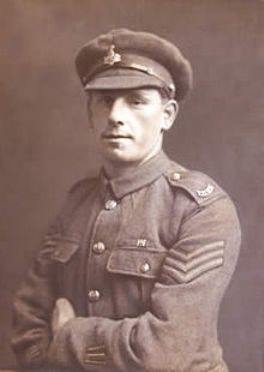
William was born on the 16th December 1894 in the village of Murton in County Durham. At 14 he would follow his father down the pit at Mutton Colliery. At the outbreak of war he enlisted on the 3rd September, aged 20, into the Yorkshire Regiment, The Green Howards, and was posted to the 8th (Service) Battalion.
The Battalion travelled to France in August 19115 as part of the 69th Brigade, 23rd Division. It was during the Somme offensive in 1916 that William would win his first Military medal, having gone out into no-man’s-land to rescue a wounded officer. The following year during 3rd Ypres, generally known as Passcheandaele, he received a bar to his Military Medal, again recuing men wounded or buried under shellfire.
In late 1917 he was part of the detachment of British and French troops sent to the Italian front to bolster the Italians after their disastrous defeat at the Battle of Caparetto. In October of 1918 the allied advance culminated in their victory at the Battle of Vittorio Veneto paving the way for the total defeat of the Austrian Army. It was during this battle that William received the Victoria Cross having put to flight the enemy and capturing a machine gun.
William left the Army in February 1919 and returned to life down the pit at Murton Colliery. He married and would father 6 children. In 1940 he joined the Local Defence Volunteers in Murton and the following year served in the Durham Home Guard. In 1947 he became a foreman at a timber yard that made pit props retiring in 1947. He died, aged 81, on the 5th January 1976.
Explore more memories from the ribbon
-
William John Blore
Submitted by Andrew Fynn. William John Blore was my Great Grandfather and was born in Leeds in 1877. He enlisted in the Yorkshire Regiment as a private in July 1894. His initial service was in India with the 2nd Battalion, during which his daughter Louisa Doris tragically died. More tragedy ensued in 1906 as his wife died after giving birth to his daughter Kathleen at Richmond. He did re-marry and seems to have left the army prior to 1909 when he was known to be a postman. As his military record is lost it’s unclear how he came to be back in service so we assume he must have volunteered and became part of the 6th Battalion, Yorkshire Regiment (the Green Howards) in August 1914 as Company Sergeant-Major. On 3 July 1915, the 6th Battalion sailed from Liverpool on board the Aquitania, bound for the Dardanelles campaign. On 6 August 1915, the 6th Battalion embarked for Gallipoli and the landing and attack at Suvla Bay. At 23.00 hrs, following the landing at Suvla Bay, he was part of the attack on Lala Baba Hill, the first ‘Kitchener unit’ to be involved in a major offensive operation of the war. The attack eventually cleared the hill of the Turks but not before they inflicted serious casualties on the attackers which, unfortunately, included William, only hours into his first action. His body wasn’t found in the aftermath of the action and he is commemorated at the Helles memorial. His role at Gallipoli…
-
John C Morris
John Charles Morris was from South Hetton. He was born in 1896 and was 18 when he enlisted in the Yorkshire Regiment as 14136 Private Morris. He served in the 8th, 9th and 10th Battalions and was awarded the 1915 Star, the British War Medal and the Victory Medal, as well as the Silver War Badge. He was wounded in December 1915 and again in November 1916. He suffered a gun shot wound to his left hand and lost part of a finger and substantial power and movement in his right hand. He also suffered a shrapnel wound to his left foot. These injuries precluded manual work due to a lack of power in his hands. After his discharge in December 1918 he was awarded a pension of 8 shillings a week and was subject to regular reassessments of his injuries. He died aged 61 in 1957.
-
Robert Baden Powell
Submitted by Neil Duncan of the 8th Darlington (Cockerton Green) Scout Group. Lieutenant-General Robert Stephenson Smyth Baden-Powell, 1st Baron Baden-Powell, OM, GCMG, GCVO, KCB, DL was born in 1857 and had a long and illustrious military career, as well as having a profound impact on civilian life for generations of young people. Baden-Powell spent most of his military service in India and Africa where he honed his Scouting skills and began writing training manuals which would later be the basis for the Scouting Movement from 1908. One of his most famous commands was during the Seige of Mafeking in 1899 when a small garrison held out for 277 days and a ‘Cadet Force’ was drawn up take over small but important jobs to allow the adults to fight. These Cadets gain an honourable mention in the opening chapter of Scouting For Boys. He returned to England to take up a post as Inspector-General of Cavalry in 1903. From 1908-10 he was in command of the Northern Territorial Army. During this appointment, Baden-Powell selected the location of Catterick Garrison to replace Richmond Castle which was then the Headquarters of the Northumbrian Division. His plan was brought to fruition following the outbreak of the First World War. The original concept was for a temporary camp to accommodate 2 complete divisions, 40,000 single men in 2,000 huts. On the outbreak of World War I in 1914, at the age of fifty-seven, Baden-Powell put himself at the disposal of the War Office. Lord Kitchener…
